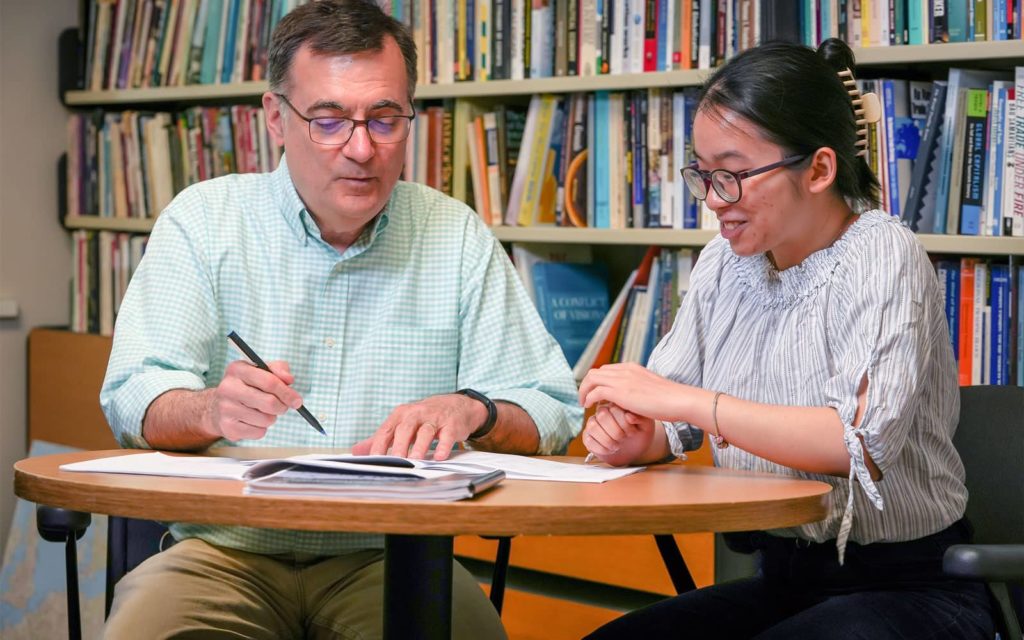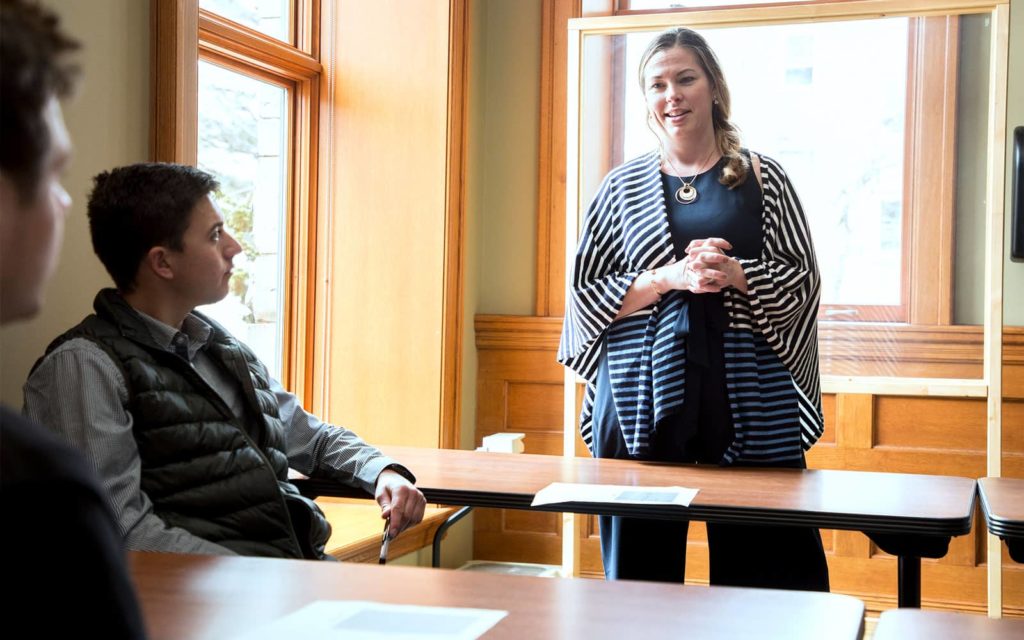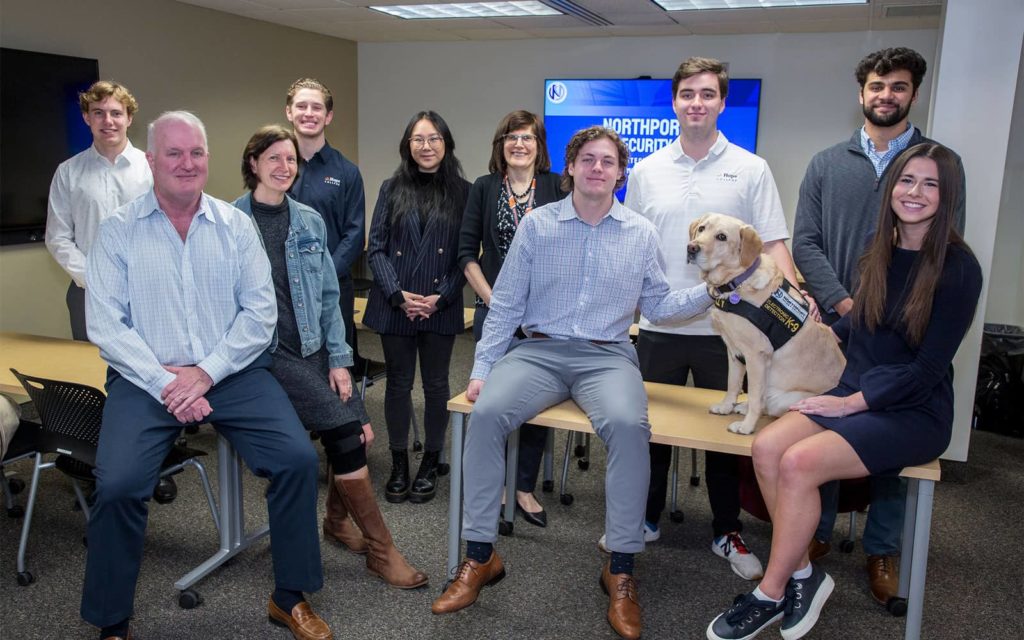Faithful & Excellent
Before Dr. Stacy Jackson shifted his roles in business and higher education into specifically Christian higher education more than 20 years ago, he had a particular, memorable conversation with his wife.
“I’m mad,” he told her. “It’s not okay that you can get an average economics and business education at a faithful school, but to get a good education, you’ve got to go somewhere else.”
That conversation was a turning point in Jackson’s career. He ultimately took on a role in the Department of Economics and Business at Hope College, and since joining the faculty in 2007 has devoted himself to stewarding and enhancing — along with his colleagues — a program with a long tradition of being both faithful and excellent.

Jackson is the Kenneth J. Weller ’48 Professor of Management and chair of the department, which has grown from around 80 graduates in 2014 to more than 150 graduates in 2022. Of the more than 300 prospective students that engage with the program each year, many are comparing Hope not against other peer institutions but against larger universities and business schools like Butler, Notre Dame, Michigan State University and the University of Michigan.
For a department that’s delivering the depth of experience similar to a big business school but within the context of a small liberal arts college, Hope is clearly punching above its weight.
“Many other business programs have large, specialized majors; they’ve pushed out the breadth of the liberal arts; and they can take up to two-thirds of a student’s entire 120 credits.” In contrast, Jackson said, “We don’t believe these hyper-specialized majors give you room for exploration or a broad education. At the same time, we don’t aim for merely a small major that doesn’t have adequate depth around what a student might actually do after graduation.”

In fact, this aim toward life after graduation is an impetus for giving students a wide range of experiences, so they can first assess their skills and interests and then choose what to pursue. In other words, the department has made a deliberate choice to push against the way some other schools pursue the ideas of vocation and calling, instead offering appropriately sized business and economics majors that also lean into the liberal arts.
“Many people view college as a simple transaction, much like an ATM where you just pick a major and get a degree. But students are going to spend their college years, and the years immediately following, doing far more discernment than they’ve done in their entire life so far,” Jackson said. “We want them to be really good at discernment. That’s why we immerse them in community, education and experiences first, so that they can find their calling on the other side of that knowledge.”
“This whole team is faithful and excellent. That’s why we draw faculty from Harvard, Cornell, Stanford and other top graduate schools.”
Graduates’ Areas of Employment
As an intentional part of this process, the program exposes students to a wide scope of the business world. The department engages with more than 500 professionals every year (up from 250 professionals in 2018); these professionals represent more than 180 local, regional, national and international firms in places as local as a start-up or non-profit in Holland, and as wide-ranging as Goldman-Sachs in New York City or the Mercedes-Benz Stadium in Atlanta, Georgia. The program also regularly engages students in applied projects with clients, summer research projects, nine-plus co-curricular programs in a variety of business functions and skill-based workshops led by organizations such as IDEO and Training the Street.
“They’re learning about the breadth of calling and a world where roles in fields such as finance, marketing and operations are more complex than they’ve ever been,” Jackson said. “The right level of sophistication in these fields elevates a student’s ability to be faithful in them.”
Public accounting major Elnora Lunga ’25 underscores this point. “Our education is a tool to enhance our ability to live into the fullness of who we are meant to be,” she said. “In having an academic department approach education with the goal of living a life for Christ, it propels us further toward Him.”
The approach is clearly working. Currently, more than 500 students are pursuing a major or minor through the Department of Economics and Business, amounting to some 20% of recent years’ graduating classes. And despite the strain these numbers can place on department resources, it consistently achieves placement rates above 98% (including at global firms such as JPMorgan and Whirlpool), integrated experiential learning for all its majors, and top finishes in case competitions where students test technical knowledge against other colleges and universities.

“The college specifically wants to be faithful to the historic Christian faith, and I’ve enjoyed the freedom to think about Christian issues in the course of actual economic study.”
“This whole team is faithful and excellent,” Jackson said. “That’s why we draw faculty from Harvard, Cornell, Stanford and other top graduate schools. They don’t have to be here.” He says a primary reason Hope can draw such talented faculty is because they believe in Hope’s Christian mission.
Dr. Stephen Smith, the Robert W. Haack Professor of Economics, agrees. “The college specifically wants to be faithful to the historic Christian faith, and I’ve enjoyed the freedom to think about Christian issues in the course of actual economic study,” he said. “It’s such a joy to have the freedom to do that without giving up an inch on preparing students well in economics’ technical aspects.”
Smith, who completed his graduate work at Stanford University, is also the current president of the Association of Christian Economists; the association’s journal, Faith & Economics, is edited by Dr. Steven McMullen, professor of economics at Hope. McMullen holds a Ph.D. from University of North Carolina at Chapel Hill.
“The basic idea is that, yes, I’m an economist — I do economic research, and my specialization is in global trade and economic development — but I’m Christian as well, and economics and faith really can speak to one another,” Smith said.
“What we’re doing should not be shocking,” Jackson said. “Hope is a Christian college. We’re just inviting students to a historic Christian perspective in business and economics and preparing them to be excellent wherever they decide to go.”

It’s a combination, he explains, that was deliberately baked in by Hope’s fifth president, Dr. Edward E. Dimnent, when he established the program in 1931 (making it, incidentally, the second-oldest business program in Michigan).
98% increased confidence
when making career decisions
because of our
4-year externally engaged
vocational discernment process
Smith gave the example of classes that explore what he calls “some of the enduring issues of Christian thinking” on economics: Is my neighbor the person right in front of me, or someone across the world who needs help? I’m just out of college: Should I be giving? What does it take to cultivate a life of generosity? What kind of industry should I work in?
98.2% of graduates majoring in business or economics
were employed or in graduate school approximately six months from graduation
“There’s a lot of insight on these questions that come from Christian scholarship and writing over the past two millennia. There’s a rich tradition that we can draw on,” he said.
Jackson returned to the theme he identified 20 years ago: “For many students, they feel you need to choose between excellent education or faithful education — between a haven or intellectual engagement,” he said.
At Hope College, you don’t have to choose.


